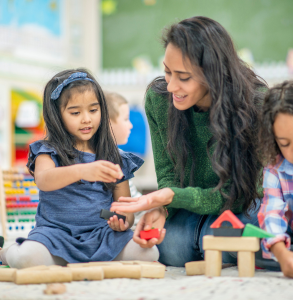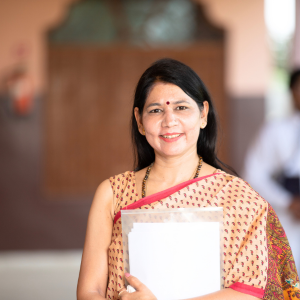-
Welcome to IMTTC
Admission Enquiry -
Toll Free No 1800-8432-500
8893 555 666
The Montessori system of education, named after Dr. Maria Montessori has today, become synonymous with pre-school education. Her concepts revolutionized the way the world saw small children. She referred to the mind of a child betwene3 & 6 years of age, as the Absorbent Mind. During this time he literally absorbs everything in his environment through sensorial exploration. By sensorially absorbing the surroundings, a child forms his personality and himself. He constructs his mind, his memory, power to understand and ability to think through impressions gained from the environment. Educational research has also verified that the early years are the most important years of a child’s life. It is during the period between conception and four years that the child develops 50-60 % of his intelligence and another 30% between the ages 4 to 8 years. Very little develops after that. Today each parent wants to give their child the best education, however they have grown to realize that academic achievement alone will not prepare their child for life. Each child has certain vital needs as it grows up. In an academic environment these needs are generalized, hence these needs may be overlooked. However Montessori education strives to fulfill these individual needs.
Dr. Maria Montessori believed that a child has the inbuilt tendency to learn by himself. The child is the constructor of the adult. Mother Nature has endowed the child with necessary powers to fulfill this task. The child achieves various levels of growth, within the time spans fixed by nature. We have no control over them. All he needs is an encouraging environment, which fulfills his developmental needs. The key elements of the Montessori method are Self-education, individual instruction , didactic materials, a specially prepared environment and the trained directress. A Montessori school provides prepared environments for children at each successive developmental plane where children are given freedom to work according to their inner urges. The child’s natural interest in learning is encouraged by giving opportunities in spontaneous, purposeful activities with the guidance of a trained adult. Within a framework of order eliminating the bane of competition, the children progress at their own pace and rhythm, according to their individual capabilities. These environments allow them to take responsibility for their own education. A sophisticated balance between liberty and discipline is prevalent. Maria Montessori’s fame is largely due to the apparatus to which her name has been given and to the result it produces while bringing out the hidden learning powers of the child. Younger children are intensely attracted to these materials and use them spontaneously, independently, repeatedly and with deep concentration. These materials are precision made, beautiful and enticing. The outstanding feature of these materials is that they have built-in “control-of-error” by which the child is enabled to judge his/her performance objectively and independently and to truly learn from one’s mistakes.
A Montessori school is equipped with more than 100 different types of Montessori Apparatus, classified into Sensorial Material, Language Material, Arithmetic Material, and so on. Practical Life Exercises, through the use of Sensorial Material, instill care for themselves, for others and the environment. Using this material, children learn to grade and classify impressions. They do this by touching, seeing, smelling, tasting, listening and exploring the physical properties of their environment, through these specially designed materials. The role of a trained Montessori teacher is that of an observer whose ultimate goal is to intervene less and less as the child develops. The teacher creates an atmosphere of order and joy. Knowing how to observe constructively and when, and how much, to intervene is one of the most important talents that the Montessori teacher acquires during a rigorous course of training. The teacher’s role is to provide the right environment for the child and make sure that the child can work at his own development in peace and freedom. The adult should understand that it is the child who has to achieve his goals. The adult cannot do it for him. Therefore, the adult should learn not think, ” I have to mould my child. I have to make him a doctor, engineer etc.” The role of building the child is that of nature and the child himself. For ordinary schools, education is same as literacy, but Maria Montessori calls it as “an aid to life”, making the Montessori system, a highly successful learning concept that has been acclaimed the world over. “Knowledge is necessary, but not sufficient. The well educated person is a well developed person who knows how to live a healthy life in every aspect of human existence- a well developed personality.” – Dr.M. Montessori



The Montessori Method was developed through observation of the child, with the individualized needs of each child as a primary focus. Montessori education is devoted to helping each child achieve his or her potential and develop a lifelong love of learning. An attractive and orderly prepared environment, unique learning materials, and special way of viewing and teaching the child are essential parts of Montessori education.
The mixed age group in a Montessori environment encourages an individual approach for each and every child. The Montessori teachers are trained to follow each child’s learning path and assist the child accordingly. It also enables children to learn from the environment and from each other.
Montessori philosophy is based on the ‘ Sensitive periods’ all children go through. These unique periods are the optimum time for the development of skills and aptitudes which support the unfolding of their true potential.
The Montessori classroom nurtures children’s imagination by providing many opportunities for exploration and creativity. Montessorians believe that all such activities foster creative thinking and support the unique nature of all human beings.
A child’s independence is a key objective of the Montessori approach. Acquiring life skills such as personal hygiene, dressing, caring for themselves, others and the environment are at the base line of Montessori classroom practice. It also helps the child inculcate good manners and respect for each other and the environment.
Montessori Method is a multi-sensorial approach .All children learn through sensory exploration of their environment. “Senses are the gateways to the intelligence”, Dr Montessori. The Sensorial activities in a Montessori classroom build on the child’s early impressions of the world and form a foundation of all future learning.
Most of the early numeracy skills are rooted in everyday activities of the classroom and within the sensorial activities which give opportunities for sorting, sequencing, matching, pairing, and shape recognition. The Montessori arithmetic materials build a firm foundation for number operations through manipulation of concrete representations of number and numerical recognition.
Montessori Method follows phonetic approach to facilitate the child in mastering a language / languages. Montessori teachers encourage the development of language skills through songs, rhymes and games. Through listening to children and engaging in conversations with them, children’s vocabulary is extended and their ability to express their ideas orally is extended. The method focuses on preparing the child thoroughly with pre -writing and pre-reading skills .The Montessori teachers are trained to introduce grammar alongside the child’s growing reading and writing skills.
